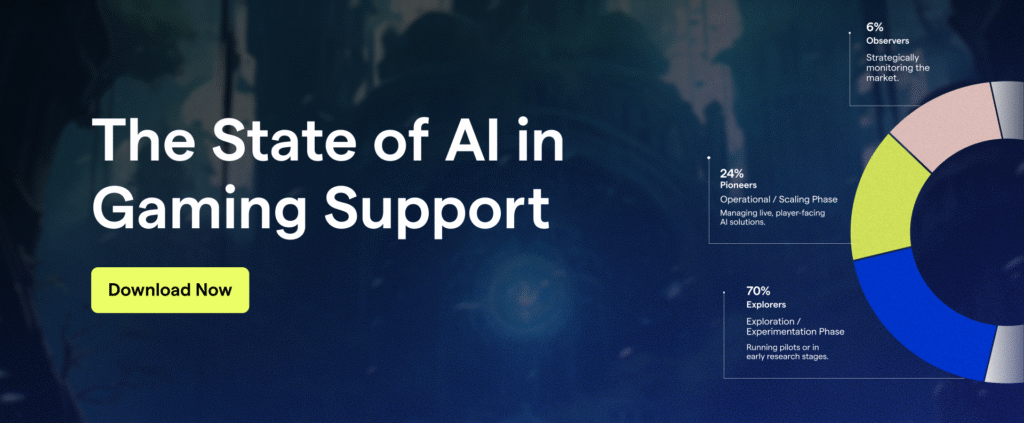It’s 8:03 PM in Tokyo. A player’s game crashes mid-boss fight. They fire off a support ticket—in Japanese.
The only agent online? Sitting in Dublin. Speaks English. The result? Delayed response, poor experience, one angry player.
Welcome to global gaming. Games today connect players from every corner of the world. In a single hour, support teams might get tickets in Spanish, Korean, Arabic, and French—all needing quick, accurate replies.
Traditionally, companies hired multilingual agents to keep up. But that model doesn’t scale. It’s expensive, time-consuming, and nearly impossible to cover every language, every time zone. That’s where AI changes everything.
AI-powered multilingual support lets agents instantly understand and respond in any language—without relying on Google Translate or long escalations. A Spanish complaint in Bogotá? Solved by an English-speaking agent in Manila. Seamless.
This article explores how smart language tech is empowering support teams, reducing burnout, and delivering fast, localized help to players around the world.
The Multilingual Support Challenge in Gaming
Gaming companies face unique multilingual challenges that traditional business models don’t encounter. Unlike standard e-commerce or software support, gaming issues often involve complex technical problems, cultural references, gaming terminology, and emotional situations where players have invested significant time and money.
1. Scale and Complexity Issues
Modern mobile games regularly attract players from 50+ countries speaking dozens of languages. Managing native-speaking support agents for each language creates enormous operational complexity. Companies must recruit specialized talent, provide consistent training across cultural contexts, manage different time zones, and maintain quality standards across diverse teams. The cost scales exponentially with each new market, often making global expansion prohibitively expensive.
2. Gaming-Specific Language Challenges
Gaming terminology presents unique translation challenges that generic language tools can’t handle effectively. Terms like “meta,” “nerf,” “buff,” “griefing,” or “RNG” have specific meanings in gaming contexts that don’t translate directly. Additionally, gaming issues often involve emotional language—players expressing frustration, excitement, or urgency—that requires cultural sensitivity and contextual understanding beyond literal translation.
3. Real-Time Response Expectations
Gaming support operates in real-time environments where delayed responses can ruin player experiences. Unlike traditional customer service where 24-hour response times might be acceptable, gaming issues often require immediate attention. Players experiencing problems during limited-time events, competitive matches, or social gaming sessions expect instant help, regardless of language barriers.
4. Quality Consistency Across Languages
Maintaining consistent support quality across multiple languages is exceptionally difficult with traditional approaches. Different agents have varying skill levels, cultural understanding, and gaming knowledge. This inconsistency creates unequal player experiences where some language communities receive superior support while others feel neglected, directly impacting player retention and satisfaction.
AI-Powered Solutions Transforming Agent Capabilities
Modern AI-powered multilingual support systems address these challenges by augmenting human agents with intelligent language capabilities, creating hybrid support experiences that combine technological efficiency with human empathy and understanding.
1. Real-Time Translation and Context Awareness
Advanced AI translation goes far beyond basic word conversion. Modern systems understand gaming contexts, cultural nuances, and emotional undertones. They can translate complex gaming terminology accurately while maintaining the original message’s intent and emotional impact. AI-powered multilingual support enables agents to communicate naturally with players in any language without losing meaning or context.
2. Intelligent Agent Assistance
AI systems provide real-time support to agents during multilingual conversations. They can suggest culturally appropriate responses, explain cultural context behind player messages, and recommend solutions based on language-specific gaming behaviors. This assistance empowers agents to provide personalized support even when serving players from unfamiliar cultural backgrounds.
3. Automated Language Detection and Routing
Smart systems automatically detect player languages and route inquiries to appropriate agents or AI systems. This routing considers not just language compatibility but also agent specializations, current workload, and cultural expertise. Advanced automation capabilities ensure players always connect with the most suitable support resources.
4. Sentiment Analysis Across Languages
AI can analyze emotional context in multiple languages simultaneously, helping agents understand player frustration levels, urgency, and satisfaction regardless of linguistic barriers. This emotional intelligence enables more empathetic and effective support interactions across all supported languages.
How to Implement Multilingual Support in AI Agent?
AI-powered multilingual support isn’t about swapping out agents for robots. It’s about giving your team a serious upgrade. When done right, it integrates seamlessly, enhances productivity, and transforms support into a high-impact function.
1. Seamless Integration, Zero Disruption
The best AI systems don’t force you to change how your team works—they slot right into your existing setup. Agents continue using familiar tools, now enhanced with real-time translation panels, cultural insights, and suggested replies. There’s no steep learning curve, no overhaul—just more power at their fingertips.
2. Real-Time Superpowers for Agents
Imagine an agent chatting with a player in Polish, while reading and replying in English—with no lag, no confusion, and no awkward phrasing. AI offers instant translations, suggests context-appropriate replies, and even flags cultural nuances. It’s like having a live interpreter, strategist, and writer in one window.
3. Smarter With Every Interaction
AI systems don’t just react—they learn. Over time, they build a multilingual knowledge base of what works, why it works, and how it could work better. This means your support gets sharper with every ticket, and agents benefit from a constantly evolving braintrust of global experience.
4. Quality That Doesn’t Break Down at Scale
Maintaining consistent quality across dozens of languages is notoriously hard—unless you automate the hard parts. AI tracks translation accuracy, tone, and player satisfaction across every language, alerting teams to gaps and opportunities. That’s quality control you can actually scale.
Case Study: Global Mobile Strategy Game Transformation
A leading mobile strategy game with over 15 million active players across 60 countries faced a growing challenge: scaling multilingual support without breaking the bank—or the player experience.
Players were forming international alliances and engaging in real-time battles, making seamless communication critical. But the support team struggled to keep up with the linguistic diversity of its global player base, and the cracks were beginning to show.
The Challenge: Limited Coverage, Soaring Costs, Unhappy Players
Before turning to AI, the company relied on:
- 45 support agents spread across three regional offices
- Native-language support in just 12 languages
- Manual translation for players using less common languages
Despite this significant investment, only 60% of the player base received native-language support. The remaining players faced long delays—often 48 to 72 hours—while tickets wepre routed through translation services.
This inconsistency had a clear impact. English and Spanish-speaking players rated support at 4.2/5, while players using other languages gave an average rating of just 2.8/5. Support costs continued to rise, and player sentiment in underserved regions dropped, putting global expansion plans at risk.
The Solution: AI-Powered Language Support at Scale
The company integrated AI-powered multilingual support into its existing help desk platform. Rather than replacing human agents, the AI acted as a force multiplier—offering real-time translation, contextual suggestions, and cultural nuance.
Key capabilities included:
- Custom training on in-game terminology, character names, and community slang
- Real-time translation with tone and intent detection
- Suggested responses based on past successful resolutions
This enabled agents to engage confidently with players in any language, without escalating or relying on clunky external tools.
The Results: Faster, Smarter, More Scalable Support
Within just three months, the support transformation delivered measurable, company-wide improvements:
- Language coverage expanded from 12 to 25 languages
- Agent team size reduced to 15, with productivity increasing by 180%
- Average response times dropped from 42 hours to under 30 minutes
- Player satisfaction among previously underserved language groups rose from 2.8 to 4.1/5
- Support costs decreased by 35%, despite broader language coverage
- The company avoided hiring 30 new agents—saving $1.8 million annually
- Revenue from non-English-speaking markets increased by 42%
- Player retention improved by 28% in regions that had previously lacked fast, effective support
The Human Impact: Empowered Agents, Happier Communities
Beyond the metrics, the support team experienced a significant morale boost. Agents felt more effective and less overwhelmed, and collaboration between regions improved. They could focus on solving problems instead of navigating language barriers.
Players noticed, too. Communities that had once felt neglected began posting positive reviews and praising the support team’s responsiveness—in their own language. The improvement in sentiment was visible across app stores and social media platforms.
Why Agents Love It
AI support isn’t just about happier players—it’s about happier agents too. Here’s why it’s a game-changer on the team side:
- Less stress, more confidence: Agents no longer worry about misunderstanding a ticket or saying the wrong thing. The AI has their back.
- More focus on problem-solving: Without the distraction of translation, agents can dig into real player issues.
- Better career paths: Agents get to work on more complex issues across more regions, building global skills that lead to promotions—not burnout.
- Knowledge sharing that works: Solutions that work in Brazil can now help players in France. The AI turns isolated wins into team-wide insights.
Measuring What Matters: ROI That Shows Up Fast
Let’s talk impact. AI-powered multilingual support delivers on all the metrics that matter to your business.
- Player satisfaction jumps: Previously underserved language markets typically see CSAT rise by 40–60%.
- Agent productivity skyrockets: Teams handle 150–200% more tickets without losing quality.
- Revenue climbs: With better support, retention rises, in-app spending increases, and global markets become viable.
- Support costs drop: Companies often save 30–50% by avoiding specialist hires and expensive translation tools.
How to Make It Work: Best Practices That Set You Up for Success
Rolling out multilingual AI isn’t plug-and-play—you need a smart plan. Here’s what works:
- Cultural sensitivity training: Language is just one piece of communication. Equip agents to understand regional expectations and tone.
- Start smart: Begin with top language groups, monitor quality, then scale systematically.
- Keep eyes on quality: Use real-time monitoring to catch mistranslations or tone mismatches before they hurt the experience.
- Listen to your agents: The best AI implementations evolve with frontline feedback. Make agents part of the loop.
What’s Next: The Future of Multilingual AI Support
We’re just getting started. The next wave of AI-powered support will push the boundaries even further:
- Voice support in any language: AI will soon handle voice chats and phone calls with real-time interpretation, ideal for complex tech issues.
- Predictive assistance: AI will detect potential issues based on player behavior—and offer help before tickets are submitted.
- Emotion-aware AI: Future models will understand frustration, sarcasm, or urgency across cultures, helping agents respond with empathy.
- Community-powered AI: Multilingual tools will extend into player forums and in-game chats, enabling global community support with professional oversight.
Strategic Advantage: Not Just Support—A Growth Engine
Multilingual AI support does more than reduce ticket queues. It unlocks new market potential, enhances your brand, and makes scaling sustainable.
- Confident global launches: You can expand into new countries without scrambling to build local support teams.
- A real differentiator: In regions where competitors offer slow or no support, you win by simply showing up—quickly, and in the right language.
- A stronger brand: Players talk. Great support in every language earns trust, glowing reviews, and viral word of mouth.
- Built to grow: Unlike hiring sprees, AI scales efficiently as your player base grows—without sacrificing quality.
The Bottom Line
AI-powered multilingual support is more than a tech upgrade—it’s a strategy shift. You’re no longer just solving tickets. You’re delivering world-class service, empowering your team, and building an inclusive global community.
The results are clear: Higher satisfaction. Faster support. Lower costs. More revenue. Happier agents.
And in an industry where player experience is everything, that’s not just support—it’s a competitive edge.
Ready to empower your support agents with AI-powered multilingual capabilities? Schedule a personalized demo to see how Helpshift’s intelligent language solutions can transform your global customer support operations. Explore our multilingual support features and discover implementation best practices for getting started with AI-powered global support.








